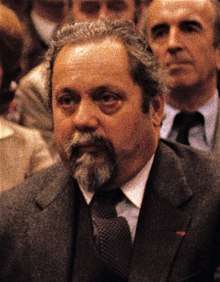Alain Bombard
Alain Bombard (Paris, 27 October 1924 – Paris, 19 July 2005) was a French biologist, physician and politician famous for sailing in a small boat across the Atlantic Ocean without provision. He theorized that a human being could very well survive the trip across the ocean without provisions and decided to test his theory himself in order to save thousands of lives of people lost at sea.
Alain Bombard | |
|---|---|
 | |
| Born | 27 October 1924 Paris, France |
| Died | 19 July 2005 (aged 80) Toulon, France |
| Nationality | French |
| Known for | Survival skills |
| Scientific career | |
| Fields | medicine biology |
Life
On October 19, 1952 Bombard began his solitary trip, after visiting his newborn daughter in France, across the Atlantic for the West Indies. He had sailed in the Atlantic Ocean solo before, from Tangier to Casablanca (August 13 – August 20), and from Casablanca to Las Palmas (August 24 – September 3). However the original plan was to sail across the Atlantic with a friend, English yachtsman Jack Palmer, with whom he sailed just before from Monaco to Menorca (May 25 – June 11), but Jack abandoned Alain in Tangier. Bombard sailed in a Zodiac inflatable boat called l'Hérétique, which was only 4.5 metres (15 ft) long, taking only a sextant and almost no provisions.
Bombard reports he survived by fishing (and using fish as source of both fresh water and food) with a self-made harpoon and hooks and harvesting the surface plankton with a small net. He also drank a limited amount of seawater for a long period on his trip. On the October 23, 4th day of the journey Bombard had to mend a torn old sail, while the backup sail was blown away. He also made a major navigation mistake which made him believe that he was sailing much faster than he actually did. On the 53rd day of the journey he encountered a ship. The crew told him that he was still over 1,000 kilometres (620 mi) short of his goal. However, after the ship's crew offered him a meal, Bombard decided to go on. Bombard reached Barbados December 23, 1952, after 4,400 kilometres (2,700 mi) of travel. Bombard had lost 25 kilograms (55 lb) and was briefly hospitalized. He published a book about his trip entitled "Naufragé Volontaire" in 1953.
Bombard's claim was later tested and contested by Hannes Lindemann, a German physician, canoeist and sailing pioneer, although both the French and Taiwanese navies concurred with Bombard's findings, the Taiwanese exercise extending to 134 days. Lindemann wanted to repeat Bombard's trip in order to gain a better understanding of living on salt water and fish, but found that he needed fresh water (from rain) most days. Lindemann later claimed that Bombard had actually taken along fresh water and consumed it on the ocean, and that he had also been secretly provided further supplies during his voyage. Lindemann's own observations about reactions to scarce fresh water supplies became the basis for the World Health Organization's navigation recommendations.
Bombard died in Toulon in 2005 at age 80.
Media appearances
Bombard was featured in an episode of the educational television program 3-2-1 Contact in 1986, in which he coaches two of the teenaged cast members on his life-raft survival techniques using a real raft on the open sea.
Books in English
- The Voyage of the Heretique, Simon and Schuster (1953)
- The Bombard Story (1955)
- Dr. Bombard Goes to Sea, Vanguard Press (1957)
In popular culture
- Alain Bombard is referenced in the Tintin story The Red Sea Sharks, where Tintin advises Captain Haddock to drink seawater, like Dr. Bombard did.[1]
External links

- Bombard's obituary in Times Online
- Drinking Seawater - The story of Bombard and Lindemann